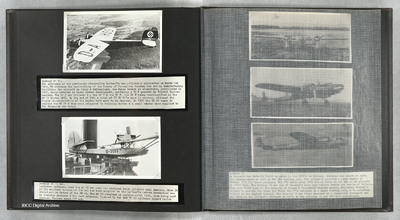Dornier DO 11 and Dornier DO 15
Title
Dornier DO 11 and Dornier DO 15
Description
Photo 1 is a port side view of a flying DO 11 heavy bomber.
Photo 2 is a starboard side view of a DO 15 on a ship' launch ramp.
Photo 2 is a starboard side view of a DO 15 on a ship' launch ramp.
Coverage
Language
Type
Format
Two b/w photographs on an album page
Publisher
Rights
This content is available under a CC BY-NC 4.0 International license (Creative Commons Attribution-NonCommercial 4.0). It has been published ‘as is’ and may contain inaccuracies or culturally inappropriate references that do not necessarily reflect the official policy or position of the University of Lincoln or the International Bomber Command Centre. For more information, visit https://creativecommons.org/licenses/by-nc/4.0/ and https://ibccdigitalarchive.lincoln.ac.uk/omeka/legal.
Identifier
PThomasAF20060031
Transcription
[Photograph]
Dornier DO 11.
The existence of the previously clandestine Luftwaffe was officially proclaimed on March 1st 1935. To overcome the restrictions of the Treaty of Versailles Germany had set up manufacturing facilities for aircraft in Italy & Switzerland, the Swiss branch at Altenrhein, established in 1927, being involved in heavy bomber development, producing a DO P powered by Bristol Jupiter engines. The DO P was followed by the DO Y & the DO F, the DO F being re-classified as the DO 11 during 1933. By the end of 1934 a total of 77 DO 11’s were in service, although the flying characteristics of the bomber left much to be desired. In 1935 the DO 23 began to replace the DO 11 & they were relegated to training duties & a small number were supplied to the Bulgarian Air Force.
[Photograph]
Dornier DO 15 Wal.
Deutscher Lufthansa used the DO 15 Wal over its airlines South Atlantic Mail Service. Some 30 of the military version of the Wal had been supplied to the Luftwaffe before production was phased out in favour of the DO 18. The DO 15 remained in service until 1938, them [sic] being used as training machines & for test purposes. Powered by two BMW V1 12 cylinder liquid cooled engines. Maximum speed 137 mph.
Dornier DO 11.
The existence of the previously clandestine Luftwaffe was officially proclaimed on March 1st 1935. To overcome the restrictions of the Treaty of Versailles Germany had set up manufacturing facilities for aircraft in Italy & Switzerland, the Swiss branch at Altenrhein, established in 1927, being involved in heavy bomber development, producing a DO P powered by Bristol Jupiter engines. The DO P was followed by the DO Y & the DO F, the DO F being re-classified as the DO 11 during 1933. By the end of 1934 a total of 77 DO 11’s were in service, although the flying characteristics of the bomber left much to be desired. In 1935 the DO 23 began to replace the DO 11 & they were relegated to training duties & a small number were supplied to the Bulgarian Air Force.
[Photograph]
Dornier DO 15 Wal.
Deutscher Lufthansa used the DO 15 Wal over its airlines South Atlantic Mail Service. Some 30 of the military version of the Wal had been supplied to the Luftwaffe before production was phased out in favour of the DO 18. The DO 15 remained in service until 1938, them [sic] being used as training machines & for test purposes. Powered by two BMW V1 12 cylinder liquid cooled engines. Maximum speed 137 mph.
Collection
Citation
“Dornier DO 11 and Dornier DO 15,” IBCC Digital Archive, accessed November 8, 2024, https://ibccdigitalarchive.lincoln.ac.uk/omeka/collections/document/23166.
Item Relations
This item has no relations.

